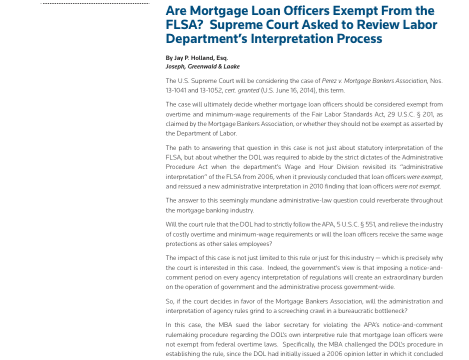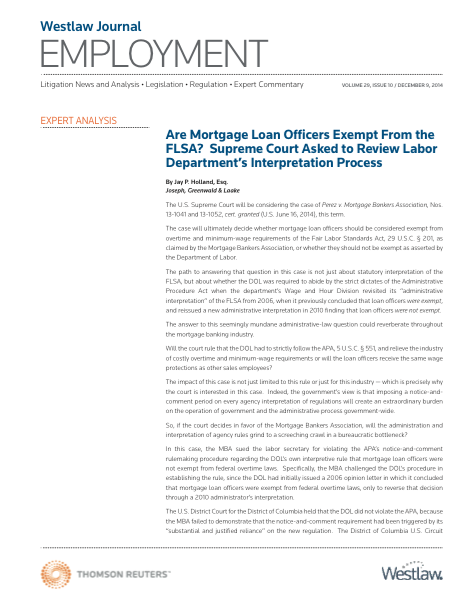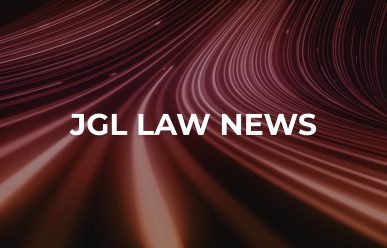Jay Holland recently authored this article in Thomson Reuters’ Westlaw Journal, Volume 29, Issue 10, December 9, 2014.
The U.S. Supreme Court will be considering the case of Perez v. Mortgage Bankers Association, Nos. 13-1041 and 13-1052, cert. granted (U.S. June 16, 2014), this term.
The case will ultimately decide whether mortgage loan officers should be considered exempt from overtime and minimum-wage requirements of the Fair Labor Standards Act, 29 U.S.C. § 201, as claimed by the Mortgage Bankers Association, or whether they should not be exempt as asserted by the Department of Labor.
The path to answering that question in this case is not just about statutory interpretation of the FLSA, but about whether the DOL was required to abide by the strict dictates of the Administrative Procedure Act when the department’s Wage and Hour Division revisited its “administrative interpretation” of the FLSA from 2006, when it previously concluded that loan officers were exempt, and reissued a new administrative interpretation in 2010 finding that loan officers were not exempt.
The answer to this seemingly mundane administrative-law question could reverberate throughout the mortgage banking industry. Will the court rule that the DOL had to strictly follow the APA, 5 U.S.C. § 551, and relieve the industry of costly overtime and minimum wage requirements or will the loan officers receive the same wage protections as other sales employees?
The impact of this case is not just limited to this rule or just for this industry — which is precisely why the court is interested in this case. Indeed, the government’s view is that imposing a notice-and-comment period on every agency interpretation of regulations will create an extraordinary burden on the operation of government and the administrative process government-wide.
So, if the court decides in favor of the Mortgage Bankers Association, will the administration and interpretation of agency rules grind to a screeching crawl in a bureaucratic bottleneck?
In this case, the MBA sued the labor secretary for violating the APA’s noticeand-comment rulemaking procedure regarding the DOL’s own interpretive rule that mortgage loan officers were not exempt from federal overtime laws. Specifically, the MBA challenged the DOL’s procedure in establishing the rule, since the DOL had initially issued a 2006 opinion letter in which it concluded that mortgage loan officers were exempt from federal overtime laws, only to reverse that decision through a 2010 administrator’s interpretation.
The U.S. District Court for the District of Columbia held that the DOL did not violate the APA, because the MBA failed to demonstrate that the notice-and-comment requirement had been triggered by its “substantial and justified reliance” on the new regulation. The District of Columbia U.S. Circuit Court of Appeals reversed the decision, concluding that “substantial and justified reliance” was not a separate component of the analysis and, therefore, the DOL had violated the APA.
The DOL did not follow the APA’s notice-and comment dictates in the 2006 opinion or in the 2010 opinion.
In 2006, the DOL issued an opinion letter in response to the MBA’s inquiry regarding whether or not its members were required to pay mortgage loan officers overtime under the FLSA. The MBA wanted to know whether the employees who “spent less than 50 percent of their working time on ‘customer-specific persuasive sales activity’” were exempt under the FLSA.
In the opinion letter, the DOL, relying on its 2004 regulations and without notice and comment, said that the exemption applied to the loan officers. At the time, the DOL concluded that the officers had primary duties “other than sales.”
Four years later, the Wage and Hour Division reversed its 2006 interpretation — again without notice and comment, and concluded that loan officers were not exempt. In 2010 the Wage and Hour Division issued an administrator interpretation that addressed whether the loan officers’ responsibilities constituted “office or non-manual work directly related to the management or general business operations of their employer or their employer’s customers.”
The administrator interpretation concluded that the FLSA exemption did not apply because the loan officers’ duties were to “sell[] loans directly to individual customers, one loan at a time.”
The legal issue thus became whether the DOL should have undergone a notice-and comment procedure when it changed its interpretation that loan officers no longer qualified for the exemption. Two District of Columbia Circuit cases have served as the guideposts for when notice and comment is required:
The tandem of Paralyzed Veterans of America v. DC Arena LP, 117 F.3d 579 (DC Cir. 1997) and Alaska Professional Hunters Ass’n v. Federal Aviation Administration, 177 F.3d 1030 (DC Cir. 1999), announced an ostensibly straightforward rule: “When an agency has given its regulation a definitive interpretation, and later significantly revises that interpretation, the agency has in effect amended its rule, something it may not accomplish [under the APA] without notice and comment.” Alaska Hunters, 177 F.3d at 1034.
Mortgage Bankers Ass’n v. Harris, 720 F.3d 966, 967 (DC Cir. 2013) (emphasis added).
The District Court ruled in favor of the DOL on summary judgment, concluding that the MBA’s reliance on the 2006 opinion letter was not “substantial and justifiable reliance on a well-established agency interpretation.”
The court added in this “third element” of “substantial and justifiable reliance” to the notice-and-comment test, explaining that in MetWest Inc. v. Secretary of Labor, 560 F.3d 506, 511 (DC Cir. 2009), the District of Columbia Circuit had previously “stressed that a core tenant [sic] of the Alaska Professional Hunters decision was ‘substantial and justifiable reliance on a well-established agency interpretation.’” Mortgage Bankers Ass’n v. Solis, 864 F. Supp. 2d 193, 208 (D.DC June 6, 2012).
On appeal, the District of Columbia Circuit explained that “[t]he only question properly before this three-judge panel is a narrow one: what is the role of reliance in this [Paralyzed Veterans–Alaska Hunters] analysis?” Mortgage Bankers Ass’n v. Harris, 720 F.3d 966, 967 (DC Cir. 2013) (emphasis added).
The appeals court reversed the District Court, explaining that the lower court’s added element of “substantial and justifiable reliance” was merely part of the first prong of the notice-and-comment test (i.e., that the agency had made a definitive interpretation of the rule at issue).
Given that the DOL had conceded at oral argument that the MBA had satisfied the first two elements under District of Columbia Circuit notice-and-comment precedent, the appeals court reversed the District Court’s decision and ordered that the 2010 administrator interpretation be vacated. As a result, the loan officers were considered to be exempt, at least until the DOL complied with the notice-and-comment requirements of the APA.
If this decision were to apply across the board to all agencies, it could surely cause substantial delay and obstruct the implementation of policy. So, what does the government argue to the court to rid itself of these potential odious consequences?
The government proffers that Paralyzed Veterans and Alaska Hunters manufactured a judge-made procedural requirement that is contrary to the text of the APA. The APA “expressly exempts interpretive rules from the act’s notice-and-comment-rulemaking requirement.” See Federal Petitioner’s Brief at 11, Perez v. Mortgage Bankers Ass’n, Nos. 13-1041 and 13-1052 (U.S. Aug. 20, 2014), 2014 WL 4101228. Section 4 of the APA, 5 U.S.C. § 553(b)(A), exempts “interpretive rules” from those requirements.
From the viewpoint of certain textualists on the court, this angle could certainly have appeal. However, the view of certain justices who may be inclined to discredit “lawmaking by bureaucrats” might overcome those textual tendencies and result in a favorable outcome for the MBA.
The MBA, in contrast, argues that the Paralyzed Veterans–Alaska Hunters dichotomy “promotes good government” and that notice-and-comment rulemaking “not only protect[s] the legitimate reliance interests of those regulated by administrative agencies, but also [] vindicate[es] the interest of every citizen in promotion of accountable, transparent government.” See Respondent’s Brief at 28, Perez v. Mortgage Bankers Ass’n, Nos. 13-1041 and 13-1052 (U.S. Oct. 9, 2014), 2014 WL 5202051 .
Further, the MBA raises the concern that if the court were to chip away at the Paralyzed Veterans doctrine, would-be participants in the rulemaking process will have their voices silenced, “with no corresponding gain in government transparency or accountability.” Id. at 33.
Moreover, the MBA argues that it could potentially promote bad behavior by agencies. For example, an agency could deliberately make a vague rule, only to then “interpret” that rule without any contribution from potential participants in the rulemaking process. Finally, the MBA argues that the preservation of notice-and comment rulemaking in this context respects the separation of powers in that agencies already have the power to fill in the gaps of ambiguous statutes and Congress has already granted agencies limited jurisdiction to adjudicate certain claims.
In its reply brief, the government took issue with the MBA’s policy justifications for discarding the Paralyzed Veterans rule, contending that although “greater public involvement” would obviously be a positive component of the rulemaking process, such procedures in “all rulemaking contexts come at a significant cost to agency time and resources and the prompt correction of erroneous interpretations.” See Federal Petitioner’s Reply Brief at 23.
The government made clear, however, that it did not advocate for a widespread limitation on notice-and-comment rulemaking, but rather only for greater agency discretion “to decide on a case-by-case basis in which particular contexts they should dispense with or utilize public procedures.” Id. at 24. Supreme Court precedent on the issue is sparse. The DOL relied partly on the Supreme Court’s decision in Thomas Jefferson University v. Shalala, 512 U.S. 504, 512 (1994), which noted that an interpretation of a regulation may be altered sans the type of notice-and-comment rulemaking used in amending a regulation.
The DOL argued that if the MBA prevails, such a decision would be contrary to Thomas Jefferson University and irreconcilable with Paralyzed Veterans because both the initial 2006 interpretation and the subsequent 2010 opinion were not amendments to the regulation, but rather “interpretations.”
The MBA claimed that Thomas Jefferson University was inapplicable because the conclusion proffered by the DOL was dicta. Nevertheless, in Thomas Jefferson University, the Supreme Court found that where an agency interpretation is neither plainly erroneous nor inconsistent with the regulation, as opposed to a subsequent interpretation, such a construction is valid.
The MBA pointed to another Supreme Court case, Christensen v. Harris County, 529 U.S. 576, 588 (2000), arguing that only “[where] the language of the regulation is ambiguous” is notice-and-comment rulemaking not required for an agency interpretation in an opinion letter.
The MBA further contended that the DOL’s language in the 2006 interpretation was unambiguous, warranting the notice-and comment procedures. The DOL distinguished Christensen, noting that the 2006 opinion was not a regulation, but rather “an agency interpretation of a regulation.” See Federal Petitioner’s Reply Brief at 20.
The Supreme Court has yet to address whether, under Christensen, a subsequent opinion contrary to an unambiguous prior interpretation of a regulation requires procedures for notice-and-comment rulemaking.
Because this specific APA issue is one of first impression, the Supreme Court’s decision in Perez may ultimately turn on whether the opinion of the District of Columbia Circuit is at odds with Vermont Yankee Nuclear Power Corp. v. Natural Resources Defense Council, 435 U.S. 519 (1978).
In Vermont Yankee, the Supreme Court explained that the APA’s notice-and comment requirements “established the maximum procedural requirements which Congress was willing to have the courts impose upon agencies in conducting rulemaking procedures.” Id. at 524.
The Supreme Court further stated that“[a]gencies are free to grant additional procedural rights in the exercise of their discretion, but reviewing courts are generally not free to impose [additional procedural requirements] if the agencies have not chosen to grant them.” Id. (emphasis added). The Supreme Court saw the benefit of permitting administrative agencies flexibility in responding to interested parties.
The MBA claims that the Paralyzed Veterans doctrine is not “imposing new procedural requirements not found in the APA,” but rather “correctly ensures that agencies comply with the APA, thereby keeping faith with Vermont Yankee.” See Respondent’s Brief at 23.
The MBA argues that Paralyzed Veterans is consistent with Vermont Yankee, because it applies only in a narrow set of circumstances. The DOL, however, contends that such extensions of the APA are contrary to the Vermont Yankee finding that a reviewing court may not make such policy-based judgments (i.e., that courts cannot force agencies into procedures outside of the APA’s “maximum [] requirements”). Vermont Yankee, 435 U.S. at 524.
If the latter view prevails, then the government may succeed in its challenge.



